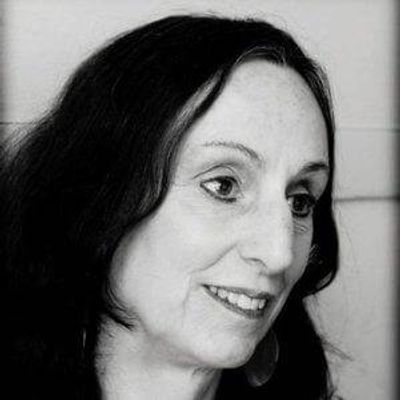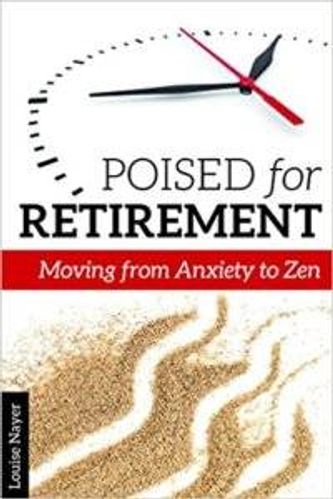Retirement Planning: Going From Anxiety to Zen
How the 'Poised for Retirement' author did it and you can, too
Louise Nayer has been retired six years and is feeling pretty Zen about it. But, as she writes in Poised for Retirement: Moving From Anxiety to Zen, that’s far different from the way Nayer felt just before she quit work at 62, a few years after her husband Jim, did.
Nayer had been an English and creative writing professor at City College of San Francisco and was exhausted. So, from that standpoint, she knew she was ready to retire. But from a financial, professional and social standpoint? Not so much.
“I would have really strange dreams about retirement,” she told me. “In one, skeletons with long white hair were beckoning me to come onto their elevator. I knew it was going down to the basement. It was a fear of being discarded.”
Nayer wrote Poised for Retirement to help others who are feeling anxious about retiring, the way she was. Part memoir (she recounts the five months before retirement and her first three years in retirement) and part self-help manual, think of this breezy read as your retirement Sherpa.
I had a chance to talk with Nayer about the fears many of us have about retiring and her advice for overcoming them. Highlights:
Next Avenue: Why did you write this book?

Louise Nayer: I started it as a series of journal entries when I was leaving my job as a way to deal with the anxieties that kept cropping up. I didn’t want to just express the anxieties. I wanted to articulate what a lot of people feel, but don’t say. I think it’s important to know what you’re feeling, so you can work toward having a more meaningful life in retirement.
As I was writing things down, I was making the decision: Should I even do this? I was getting out sooner than I should have financially. As I continued, I was writing thoughts and feelings about things like leaving your comfort zone — What will it be like not to have an office?
You interviewed 17 people for the book who were planning to retire or had retired. What did they have in common?
Although everyone’s story is unique, there are a lot of universals. I talked to someone with $2 million in the bank and someone who lives on Social Security in a rent-controlled apartment. They’re both worried about money.
The subject of friendships in retirement is a universal: Who am I going to hang out with? I thought as I was writing the book that it could be really helpful if people did more emotional planning as well as financial planning. You have to know yourself and what you need.
And what did you decide that you needed?
I’d always been a teacher. I knew I would continue to teach, but I couldn’t keep it up at that level. And I knew I wanted to write. So before I retired, I joined a shared workspace in San Francisco: The Writers’ Grotto.
I encourage people to think about what it is you need to feel good and to start thinking of that before you retire. What would give your life meaning?
How poised were you for retirement when you retired?
I started planning in January, when I was still hearing all those voices in my head: my Depression-era mother saying: ‘Why are you getting out now?’ I was very nervous then. By May, when I resigned, I knew my money situation wouldn’t be great, but I was emotionally ready to go.
How poised do you think most people are when they retire and why?
For the most part, for a year or two before retirement, all these feelings swirl around. Some of them are about money. But also: Am I making the right decision? And children come in to it, too; it can be scary financially in a lot of ways for the next generation.
Why do you think so many people are so anxious about retirement? Is it all about worrying they will run out of money?
It’s different for everyone. For me, it was a lot of money anxiety. Loss of identity wasn’t a big deal. But for some, it’s a really big deal — especially for those who are sometimes called Previously Important People.
What are a few ways you moved to Zen and how can others do it?
One of the important things when you’re feeling anxiety is doing calming techniques. The easiest one I did was taught to me by a hypnotist who said: Breathe in to a count of four and breathe out to a count of eight.
Then there’s the dresser drawer technique: Imagine a dresser with three or four drawers and each can be an anxiety: money, will I have friends, things like that. In your mind, open each drawer and put in an anxiety. Then close the drawer for the night. That’s worked really well for me.
Another thing you can do is planning: Check out organizations and start to get an idea for the kinds of things you can do.
And get exercise. If you’re healthy, it’s great to join a gym or be part of a walking group. Retirement is a good time to exercise and eat better.
What are some things you wish you had done differently financially before you retired?
We made lot of decisions to send our kids to private high school and private college; they could have been totally happy at other schools. Running up a home equity line is another thing I wish I hadn’t done. I wish we had paid off our mortgage before we retired; that’s hard to do unless you have a ton of money.
You and your husband have rented out your home to bring in extra money in retirement. Would you recommend that to others? What advice do you have about doing this?
We started doing this when our kids were in high school. Then we started doing it with Airbnb, renting out a room. But Jim and I started to get burned out; we had so many people in our house. So we decided we wanted to either rent out the whole house and go on a trip or we would stay in a room downstairs. That’s been great, moneywise.
If you’re going to rent out part of your house or your whole house, you have to put away some things you really care about.

How much can you make by renting out your home?
In San Francisco, the short-term rental law means 28 days or less; after that, you run into a problem. So for a room in San Francisco, you can get $130 a night and you can charge a cleaning fee, too.
Talk about working in retirement: What was your thinking about that before you retired and how and why did that change once you retired?
I applied to teach in a lot of MFA [Masters of Fine Arts] distance-learning programs and none of those came through. But then I met someone who needed a memoir writing teacher and I taught a noncredit class. I met someone else who needed a teacher. It started becoming too much. Now I don’t work too much; I taught a six-week class and got $2,000. I teach two morning workshops at the Grotto and get $600 to $1,000. I help people develop memoirs, but I’ve gotten it down to one person at a time at $70 an hour.
Talk about the role of health in the decision of when to retire and what to do in retirement.
One of the things that led me to retire is I started to have a lot of symptoms. I thought I was having a heart attack and I had pains in my throat. Fortunately, everything came out OK. But I felt if I continued working, my health would have been compromised.
My husband went through the same thing. His blood pressure shot up two years before he retired and it went back to normal in retirement.
Now that you’ve been retired for six years, has retirement been better or worse than you expected?
It’s been as good or better than I expected terms of my writing life. Financially, it has not been as good as I expected. The bills keep going up. Socially? I’d say honestly I feel like I could make more time for friendship. Airbnb has impacted our social life; we never know when there will be a reservation, so we can’t invite people over as much as we’d like.
What are a few tips for people to help them have the best retirement?
For a lot of people, right after retirement, it’s good to plan some kind of trip.
Also, set up some things that will take up some of your time. It could be a book group. If you like carpentry, get something together in your basement. Or start checking out senior hiking groups. There are a lot of them. There are also a lot of classes for older adults; you can sign up for them before you retire.
Maybe there’s a hobby you used to do, like photography.
What has been the biggest unpleasant surprise about retirement since you retired?
The money situation. Life costs more than you think.
What are your retirement plans for things you want to do in the next one year, five years and beyond?
My husband I would like to do more outdoorsy kinds of stuff. We might get a car we can sleep in and do a little camping with our puppy, who we got a year ago. We have grandkids back east; I hope to visit them a little more.
I’d like to continue to write and to teach and think about ways to volunteer. There’s an elementary school down the street. I’ve been thinking of tutoring. I love working with children. I’ve thought of training my puppy to be a therapy dog and then go to colleges during final exams where they can pet your dog or go to the airport, where people are anxiety-ridden.
Next Avenue Editors Also Recommend:


